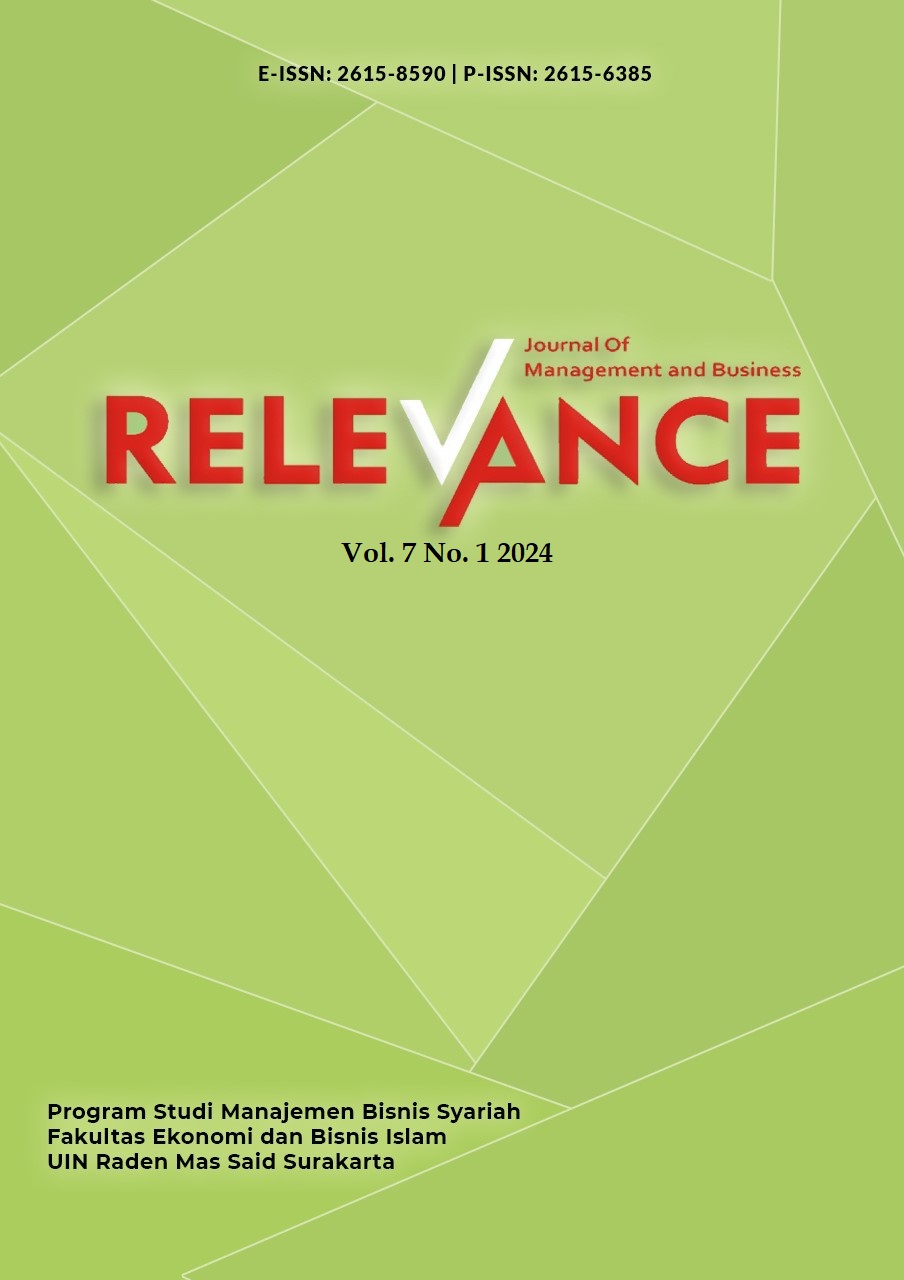##plugins.themes.academic_pro.article.main##
Abstract
The headway of information and communication technology has led to significant changes in various industries, particularly in e-commerce. The integration of artificial intelligence (AI) and immersive technologies such as augmented reality (AR) and virtual reality (VR) has created new opportunities for e-commerce to improve customer experiences.
This study analyzes the effects of implementing AI and immersive technology in e-commerce, focusing on customer engagement as a mediating factor. A sample of 99 participants was examined and analyzed using PLS-SEM by SmartPLS 4 software, and the findings indicate that AI and immersive technology have a positive, significant impact on online purchase intention. Customer engagement cannot mediate the relationship between artificial intelligence and online purchase intention. However, it does mediate the relationship between immersive technology and online purchase intention.
Keywords: Artificial Intelligence; Immersive technology; Customer Engagement; Purchase Intention; e-commerce
##plugins.themes.academic_pro.article.details##

This work is licensed under a Creative Commons Attribution-NonCommercial 4.0 International License.
References
- Ambarwati, N. F. L., Setyawati, S. M., & Novandari, W. (2023). The Influence of Customer Engagement as a Mediating Variable in the Causal Relationship between Content Marketing and Purchase Intention on the TikTok Platform.
- de Regt, A., Plangger, K., & Barnes, S. J. (2021). Virtual reality marketing and customer advocacy: Transforming experiences from story-telling to story-doing. Journal of Business Research, 136, 513–522. https://doi.org/10.1016/j.jbusres.2021.08.004
- Elvarina, E., & Murhadi, W. R. (2023). The Ffect of Customer Engagement on Purchase Intention in Kimia Farma Services in Surabaya. 4(8).
- Fransiska, Y., & Candraningrum, D. A. (2020). The Effect of Shopee Promotion Using Beautycam’s New Technology on the Lifestyle of Cosmetics Lovers: Proceedings of the 2nd Tarumanagara International Conference on the Applications of Social Sciences and Humanities (TICASH 2020). The 2nd Tarumanagara International Conference on the Applications of Social Sciences and Humanities (TICASH 2020), Jakarta Barat, Indonesia. https://doi.org/10.2991/assehr.k.201209.060
- Ghazali, I., & Latan, H. (2015). Partial Least Squares Konsep, Teknik dan Aplikasi Menggunakan Program Smart PLS 3.0. Badan Penerbit Universitas Diponegoro Semarang.
- Haleem, A., Javaid, M., Asim Qadri, M., Pratap Singh, R., & Suman, R. (2022). Artificial intelligence (AI) applications for marketing: A literature-based study. International Journal of Intelligent Networks, 3, 119–132. https://doi.org/10.1016/j.ijin.2022.08.005
- Huang, M.-H., & Rust, R. T. (2018). Artificial Intelligence in Service. Journal of Service Research, 21(2), 155–172. https://doi.org/10.1177/1094670517752459
- Huynh-The, T., Pham, Q.-V., Pham, X.-Q., Nguyen, T. T., Han, Z., & Kim, D.-S. (2023). Artificial intelligence for the metaverse: A survey. Engineering Applications of Artificial Intelligence, 117, 105581. https://doi.org/10.1016/j.engappai.2022.105581
- Leonnard, L., Paramita, A. S., & Maulidiani, J. J. (2019). The Effect of Augmented Reality Shopping Applications on Purchase Intention. Esensi: Jurnal Bisnis Dan Manajemen, 9(2), 131–142. https://doi.org/10.15408/ess.v9i2.9724
- Maylinda, W. D. (2024). The Influence of Customer Experience and Personalization of Artificial Intelligence (AI) on Shopee E-Commerce Consumer Loyalty In Surabaya. COSTING:Journal of Economic, Business and Accounting, 7(3), 6039–6048.
- Mehrabian, A., & Russel, J. (1974). An Approach to Environmental Psychology. MIT Press: Cambridge, UK, 1974; pp. 62–65.
- Perkasa, C. W., & Faritzal, A. (2022). Customer Engagement Analysis as Mediating the Influence on Social Media Marketing of Purchase Intentions on Skincare Avoskin. Journal of Information Systems and Informatics, 4(1), 30–39. https://doi.org/10.51519/journalisi.v4i1.220
- Pinedaa, A. J. M., Mohamadc, A. N., Solomon, O., Bircob, C. N. H., Superioe, M. G., Cuencof, H. O., & Bognot, F. L. (2022). Exploring the Standardized Root Mean Square Residual (SRMR) of Factors Influencing E-book Usage among CCA Students in the Philippines. Indonesian Journal of Contemporary Education, 4(2), 53–70. https://doi.org/10.33122/ijoce.v4i2.30
- Putra, N. C., Carolin, C., Jessye, G., Abib, I., & Laurel, M. (2020). Customer Engagement Impacts Towards Purchase Intentions in The Online Travel Agent Industry. Jurnal Administrasi Bisnis, 16(2), 103–113. https://doi.org/10.26593/jab.v16i2.3983.103-113
- Santy, R. D., & Iffan, M. (2023). The Effect of Artificial Intelligence and Gamification on Online Purchase Intention Mediated by Customer Experience: Study on Indonesian Marketplace Users. MIX: Jurnal Ilmiiah Manajemen, 13(1), 227. https://doi.org/10.22441/jurnal_mix.2023.v13i1.015
- Shafa, T. P., Kurniadi, E., & Yuniati, U. (2023). Impact of Customer Engagement on Purchase Intention: A Promotional Online Survey on Instagram Account of @bandengisimrb. Binus Business Review, 14(3), 259–269. https://doi.org/10.21512/bbr.v14i3.9290
- Suliyanto, Rahab, & Saadah, A. (2023a). The Role Of Artificial Intelligence (AI) In Digital Marketing: How Personalization Of Content Has Implications For Purchase Intention In Ecommerce. International Sustainable Competitiveness Advantage.
- Suliyanto, Rahab, & Saadah, A. (2023b). The Role Of Artificial Intelligence (AI) In Digital Marketing: How Personalization Of Content Has Implications For Purchase Intention In Ecommerce. International Sustainable Competitiveness Advantage.
- Sung, E. (Christine), Bae, S., Han, D.-I. D., & Kwon, O. (2021). Consumer engagement via interactive artificial intelligence and mixed reality. International Journal of Information Management, 60, 102382. https://doi.org/10.1016/j.ijinfomgt.2021.102382
- Viohafeni, Z. D., & Aliyah, K. N. (2023). Pengaruh Fitur Virtual Try-On, Online Customer Review, dan Persepsi Harga Terhadap Keputusan Pembelian Kosmetik Pada Aplikasi Shopee. Journal of Economics and Business Research, 2(2), 214–226.
- Vivek, S. D., Beatty, S. E., Dalela, V., & Morgan, R. M. (2014). A Generalized Multidimensional Scale for Measuring Customer Engagement. Journal of Marketing Theory and Practice, 22(4), 401–420. https://doi.org/10.2753/MTP1069-6679220404
- Wang, X., & Yan, K. (2019). Immersive human–computer interactive virtual environment using large-scale display system. Future Generation Computer Systems, 96, 649–659. https://doi.org/10.1016/j.future.2017.07.058
- Widarjono, A. (2014). Analisis Multivariat Terapan Dengan Program SPSS, AMOS, dan SMARTPLS (2nd ed.). UPP STIM YKPN Yogyakarta.
- Yin, J., & Qiu, X. (2021). AI Technology and Online Purchase Intention: Structural Equation Model Based on Perceived Value. Sustainability, 13(10), 5671. https://doi.org/10.3390/su13105671
- Zhang, T., Wang, W. Y. C., Cao, L., & Wang, Y. (2019). The role of virtual try-on technology in online purchase decision from consumers’ aspect. Internet Research, 29(3), 529–551. https://doi.org/10.1108/IntR-12-2017-0540
